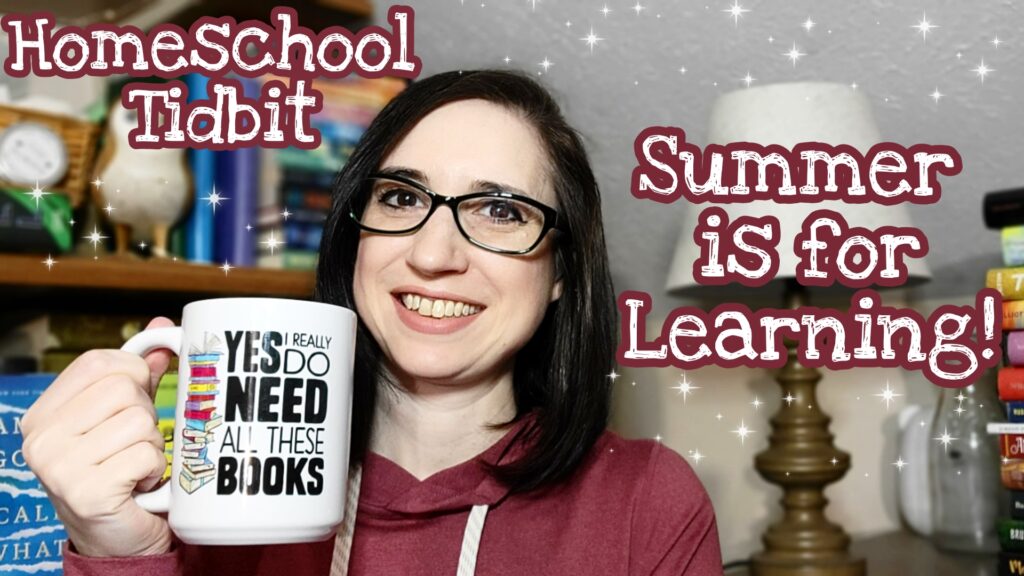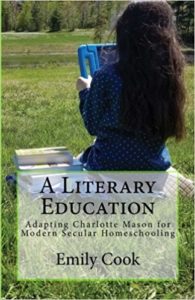Homeschool Tidbits: Summer is for Learning!
May 20, 2022

Welcome to Build Your Library’s “Homeschool Tidbits: Episode 17 – Summer is for Learning!” In this weekly video series, I will delve briefly into a topic related to homeschooling and will share some of my knowledge and expertise as a long-time homeschooling mother of 4 children. Three of whom have graduated high school, and one is also a brand new college graduate!
As the weather has suddenly reminded me that summer is right around the corner, I’ve been thinking about the end of this homeschool year. We have always followed a “traditional school schedule”, beginning in September and ending in mid-June. While we technically call summer our vacation from school, that doesn’t mean we aren’t learning. Granted, summer homeschool is nowhere near as structured as September through June. We still have lots of relaxed lazy summer days! But I like to take advantage of the summer months to work on skills or complete fun projects.
Why should you homeschool during the summer?
I don’t know about you, but I notice that if we took the summer off completely, my kids needed several weeks to play catch up once we started back. Reviewing, reteaching, and remembering what we learned the previous year is no fun for any of us. I remember when I was in public school, we basically spent the first six weeks relearning what we studied the prior year. As homeschoolers, we have the flexibility to make a learning schedule that can prevent this wasted time.
There are many schools of thought as far as what kind of schedule is best. Should you homeschool year-round? Six weeks on one week off? Traditional school year schedule with summer vacations? However you plan out your year, we all have a season that just feels more relaxed. For me, that has always been summer. The warm days just make me want to drop our routine to bask in the sunshine. We might not stick to our usual daily schedule, but we always have something educational going on.
Homeschooling is a Lifestyle of Learning
One of the things I want to make abundantly clear to my children is that learning is a lifestyle. We talked about this in-depth in our last Homeschool Tidbit “An Atmosphere, a Discipline, a Life.” It’s also not something that is confined to K-12 education, or a certain number of hours per day. We learn because it’s impossible not to! I want to guide them toward a life of self-education.
We don’t want to take a vacation from learning, so much as short breaks from our normal routine. Summer is a great time to dig into a subject that your children are really interested in or excited about, but may not fit in during the regular school year! Unit studies are perfect for summer learning because they are short and offer a fun break from our typical routine. During our summers, we’ve studied things like human anatomy, birds, sharks, gardening and botany, and fun cultural geography studies.
Summer offers a great opportunity to work on skills.
You can use these “vacation” weeks for more than just fun learning. Maybe you have noticed a skill where your child is lagging. Have they gotten stuck in math one too many times? Maybe they need more reading practice? Or perhaps their writing is not on par with where you think they should be? Summers offer a great opportunity for honing those skills because we can drop everything else to focus on just that one thing.
Now don’t get me wrong, I don’t think you should be making your 7-year-old read for 5 hours a day, or spend the entire summer on math. That sounds miserable. But I do think this is a great idea to spend some time helping a child who needs a boost. A lot can change over 6-8 weeks of summer vacation.
Let’s read All the Books!
What’s a better way to spend your summer break than reading? There is all this open-ended free time! So naturally, I want to fill a bunch of it with reading! And summers are great for free reading. I don’t assign specific books during the summer unless we’re focusing on reading as our skill. We love to take advantage of library summer reading programs and any other fun summer reading we find around town. I used to love to check off as many Pizza Hut “10 book – free personal pan pizza” cards as I could squeeze in as a kid.
Some years I come up with fun challenges. You could do Read-Ins where you just halt your regularly scheduled routine to make some tea, grab a bunch of snacks, throw pillows on the floor and read all day! Remember parents, you read too! Kids who see their parents enjoying books will be much more likely to read for fun.
Summer Learning Ideas:
- Art projects and appreciation
- Nature study
- Survival skills
- Gardening
- Unit Studies (our Shark unit is perfect for summer!)
- Family book club
- Family movie club
- Life skills (cooking, sewing, etc)
- Journaling
- Genealogy
- Living math
- Science experiments (we all have a fun stack of science kits in the closet, right?)
This summer show your children that learning can be exciting and fun!
Coming up next…
I hope you found this Tidbit helpful! Come back next week for more homeschooling inspiration!
Until then, happy reading!
See Also:
Charlotte Mason in the Secular Homeschool
A Literary Education book
About Build Your Library
Homeschool Tidbits: Build Your Library’s Weekly Video Blog Series
 Emily Cook is the author and creator of the secular homeschool curriculum Build Your Library, a literature-based K-12 program infused with the teachings of Charlotte Mason. She writes full-year lesson plans as well as shorter topical unit studies. Emily has been homeschooling her four children in Southern NH for 21 years. She is passionate about reading aloud to children of all ages and loves to share her love of literature with others. She and her family also make incredibly dorky videos about homeschooling, books, and more on Youtube at ARRRGH! Schooling. You can follow her on Facebook, Twitter, and Pinterest. You can also check out her author page on Amazon.
Emily Cook is the author and creator of the secular homeschool curriculum Build Your Library, a literature-based K-12 program infused with the teachings of Charlotte Mason. She writes full-year lesson plans as well as shorter topical unit studies. Emily has been homeschooling her four children in Southern NH for 21 years. She is passionate about reading aloud to children of all ages and loves to share her love of literature with others. She and her family also make incredibly dorky videos about homeschooling, books, and more on Youtube at ARRRGH! Schooling. You can follow her on Facebook, Twitter, and Pinterest. You can also check out her author page on Amazon.
